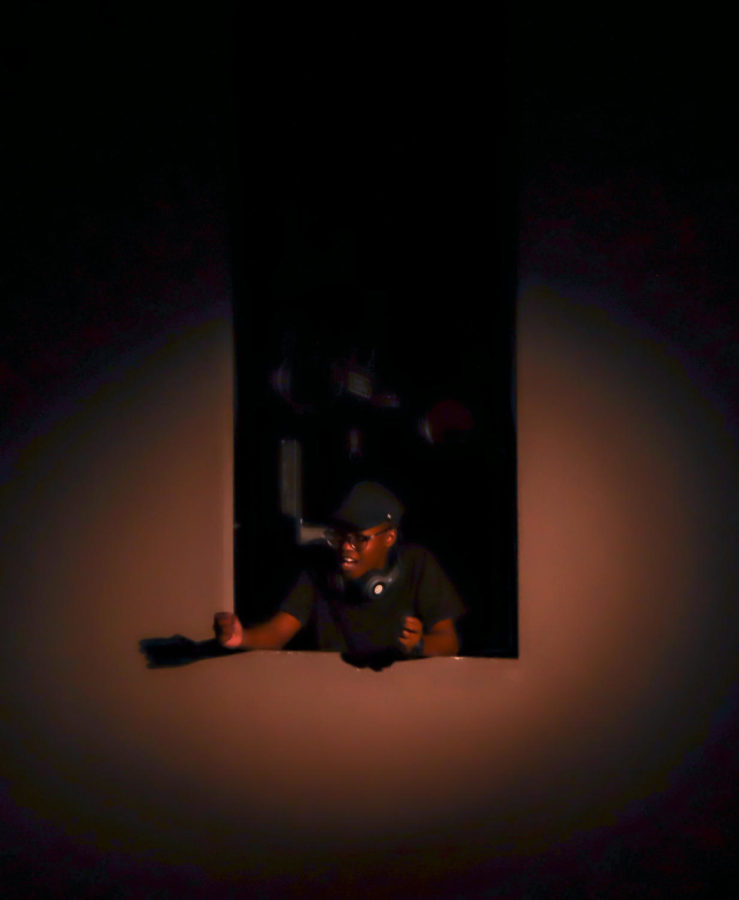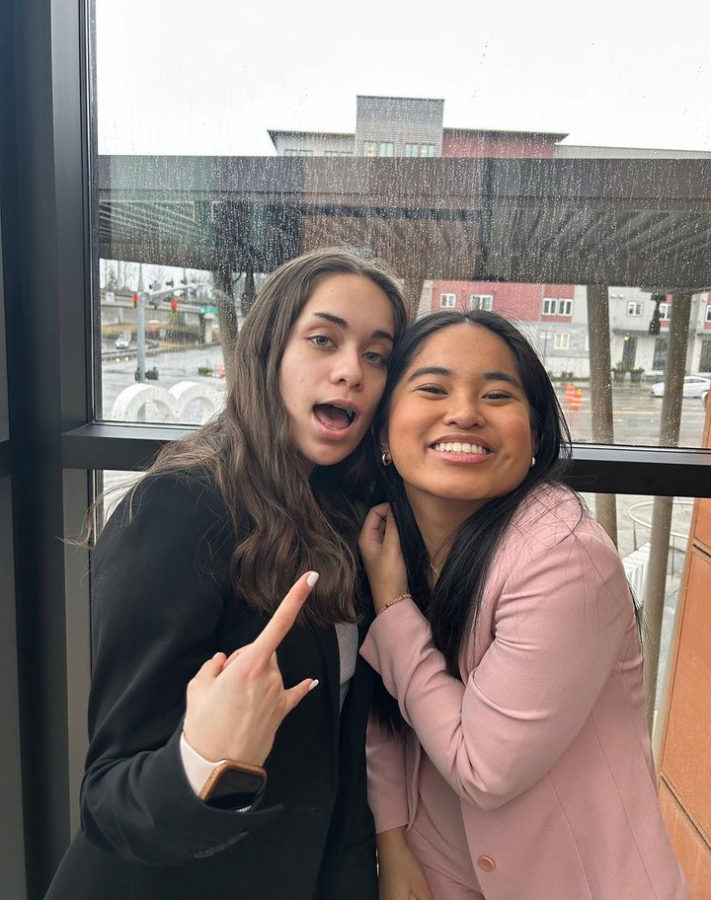She is one of the strongest people you may ever know. You have probably seen her face around school. Maybe you’re her friend, and perhaps she’s in one of your classes.
Odds are, many of you have heard her story. And when she told it, you likely felt sad, and wanted to help her. Tears may have come.
In this exclusive interview with Terrace junior Terrah Short, we are reminded of how one person’s story can truly change people’s lives.
Short has been a member of Terrace U-Turn for a year and during that time she has become one of the club’s main presenters, sharing her experience with drugs and alcohol abuse, and how it has affected her.
Students and teachers alike have all been impacted by her story. In a presentation, Short recalls a time when two girls began crying.
“I just sort of wanted to stop talking because I don’t want to bring up those hurting feelings, but at the same time that’s what I’m here to do,” Short said.
However, although it can be difficult for people to hear about Short’s life, it’s just as hard for her to talk about it. But, she said, “It’s also therapeutic because it makes me accept and realize I can do something good with it, that just because I got hurt, I can turn it into something positive and make sure that it’s something that doesn’t keep happening, and try and spread awareness and grow from my experiences rather than let them hinder me.”
Admitting that sometimes the fact that a lot of people know her story bothers her, Short retaliates, saying that it’s very personal, but she can help herself feel good about making a difference by telling her story.
Short’s mother, Sephora Andresen, suffered from an addiction to heroin and narcotics. “She smoked cigarettes starting at a young age because she was following my grandma. My grandma had started heroin in high school, too,” she said.
Short reports her mom as being a decent person who just fell in with the wrong crowd. “We saw the value in her because she was a good person, she just didn’t know how to be good to herself and be good to other people at the same time without causing someone else pain,” she said.
However, her mom was also manipulative. “She wanted to get what she wanted, but she didn’t really have the courtesy when it came to [whether] she was hurting someone or not; she was kind of selfish in that way because when you take drugs that becomes what you need to get. She needed to get the drugs so she could feel good.”
As many addicts do, Short’s mother used the people she was close to in order to get the drugs she needed. “When I was 6, she would ask to borrow money from me. And as I got older it got worse because she put me on guilt trips. In a way, she’s kind of like a parasite, because she would go from each person who was willing to help her and go from one to the next to the next as they stopped wanting to help her because sometimes people got fed up with her and would not deal with her, and that’s what happened with our family,” Short said.
Used to her mom’s later night calls for help, sometimes when the phone rings Short says she still expects it to be her mom calling late at night. “She would always call late at night. Always. Usually strung out or asking for money or asking for help or telling me she’s in the hospital, something bad,” she explained.
A lot of the time people don’t know how to deal with friends or family members who are struggling with an addiction. Although her younger brother and sister didn’t realize that their mom had an addiction, Short recalls one of the times she realized something was ‘not normal’ with her mom.
“I was at my grandma’s house and I found a makeup bag and I looked inside and I asked my dad what this was and he was like ‘Give me that.’ It was a bag full of my mom’s needles,” she said.
In another instance, Short recalls a car ride with her mom and older brother. When her older brother thought there was a needle in between the seats, all her mom could say was “Don’t tell your dad, okay?” Of course, Short told her father. They then they a discussion about what that meant and how it meant that she was doing drugs. “When my dad explained to me what it was, I still didn’t quite understand,” Short said.
It wasn’t long until her mother’s actions began to interfere with Short’s well-being. Describing herself as a really out-going person in elementary school, she loved to talk to people, smile, and dance. Right around the 6th grade things started to change.
“In 7th grade I was completely introverted: I didn’t talk to people, I used to have hair down to my waist and I cut it all off and I had a bob cut. And I dressed like a boy, I dressed all covered up because I was not very comfortable with myself. I was just really not okay with people around me. And I read a lot, like my nose was in a book all the time pretty much and I just wasn’t the same person,” Short recalls.
She says she stopped smiling altogether. This year – her junior year – was the first school photo she actually smiled in. “I look back on that and reflect and it’s just like, ‘What happened to the little girl that was always doing all kinds of things? Talking to people, dancing around and not caring what people thought?’”
Short can only wonder how much of her psychological issues, such as bad social anxiety, are linked to her mother and how much of it was already there. Short also developed trust issues because her mom would let her down so much, she says. Although repeatedly telling Short that she would come to watch her play in a sporting event or in a concert, Short says that “between elementary school and when she passed away, never once did she show up.”
“I’m in the middle of a volleyball game looking in the stands. I’m not having fun playing the game – I’m waiting for my mom who isn’t going to show. And so my trust in people really just collapsed. I still have a lot of trouble letting people in; I’m really reserved, I don’t want to get hurt like that again,” she said.
The extent of her mom’s actions doesn’t end there. Because her mom was always sick (she had Crohn’s disease, along with the smoking, drugs, and bad habits) she was always in the hospital. Short describes the hospital experiences as traumatizing and can no longer go near a hospital due to what she describes as “really bad anxiety issues.”
Short said, “I would always hear ‘I’m dying, I’m in the hospital and I’m dying, I’m dying, I’m dying!’ I heard that so much I became numb to it.”
Going through rehab three times and relapsing each time, her mother was on a downward slope. Staph infections overrode her body, destroying her immune system; a case of MRSA led to an eventual toe amputation; surgery was needed in order to drain abscesses and pocket of bacteria so that they wouldn’t burst; and her kidneys began to fail. Before her death, Short’s mom was in the hospital for 99 days, from the beginning of August to the beginning of November, 2008.
“The last time I saw her was late August, early September, either right before or right when school started, and she looked like she was not her age. She looked at least 60 or 70 years old, and she was 35. She didn’t have any teeth and she just looked really sick,” Short said.
Unable to say goodbye to her mom before her mom’s death, Short explains that she didn’t want to see her because, “I was still angry and another part of it was I just couldn’t go to the hospital again.”
Short knew that her mom was going to be released from the hospital soon because she was calling around for a place to stay, but didn’t know when. Not wanting her mom to stay with them, Short said, “I told my dad I could not take care of my mom anymore. This is not my job, I can’t do it. I’m going to be in high school, it’ll be my sophomore year. I can’t do this. I don’t want to live with her, I don’t want to see her.”
A lot of guilt resides in Short over her mom’s death. “A week or two later she kills herself? You can’t help but feel like, ‘What did I do?’ If she had stayed with us, maybe she wouldn’t have done that. Maybe it wouldn’t have happened. And even my dad had said before she died that, ‘I really hope nothing happens because we didn’t take her in.’ And then the unthinkable happens.”
Short’s mother was found dead at a friend’s house on Nov. 3, 2008, 12 hours after she was released from the hospital.
“Her cause of death was overdose, so the family debates whether it was suicide or accidental. And a lot of us do think it was suicide,” Short says.
Anger and sadness occasionally overwhelms Short regarding her mother’s death, because, Short says, “When I looked at my little brother and sister at the memorial, they were so heartbroken. I mean their mom is gone, and I’m like, ‘How could she do this to them? They don’t deserve this. They’ve had enough going on in their life.’”
Of course, Short misses her mother as well, wanting her mom to be a part of her life, like any child would, but unable to have her there.
Short recently found a missing birthday card from her mom that read, “Oh my gosh, you’re 13, I cant believe you’re getting so big, you’re always going to be my little girl. I know I’ve missed a lot of your life and I’m sorry.”
In response to that, Short says that all she could think was, “You’re missing so much more.”
Making the right choices does not come naturally for Short; she struggles just like any other person. But instead of turning out like her grandmother, mother, and uncle, who suffers from fetal alcohol syndrome, Short is committed to breaking the habit, giving partial credit to her father’s amazing parenting.
“My dad was taking really good care of me. He’s taught me how to be a really good person and he makes mistakes too.”
But, she said, “I’ve learned from my mom’s mistakes that doing drugs and alcohol, that making those kinds of choices, they’re going to get me nowhere. Drugs, especially hard drugs, all of that will take everything I’ve worked for away from me.”
After experimenting with alcohol once in the 9th grade, Short said, “All it did was give me a headache. Knowing that the temptation to have fun and try new things like any other teenager is there.”
Although the road for Short has certainly been bumpy, people have been there to help and support her. Members of Terrace U-Turn are always there for her. “It’s a place where I can repeatedly remind myself why I was born,” she said. “Why I’m important, and why my experiences matter and that they don’t make me worthless, but they make me worth more.”
Short says that the members of U-Turn hope to “spread awareness about what drugs and alcohol actually do to your body and to bring students in, like me and the others involved, to help people realize how this affects you later in life. That what you do when it comes to drugs and alcohol abuse will affect you, your family, and it’s going to continue to affect the people around you.”
“If I can help one person through this next year and my senior year in U-Turn turn away from drugs and alcohol, or anything like that – one person is enough for me to feel good about the effort I’ve put into U-Turn and going through the stress of talking about this painful experience,” Short said.
“It’s all worth it if I can help one person.”
- ACT NOW: Order your 2024 Tempo yearbook!
- BREAKING: Coach Sood stepping down as head men's basketball coach
- Hawks open season in their new Nest
Yearbook info
Digital Print Edition
The Hawkeye March 2024 issue
Turning loss around
By Vince DeMiero
•
March 31, 2011
Story continues below advertisement
Leave a Comment
More to Discover
© 2023 The Hawkeye
All RIGHTS Reserved
FLEX Pro Theme by SNO
All RIGHTS Reserved
FLEX Pro Theme by SNO
© 2023 The Hawkeye
All RIGHTS Reserved
FLEX Pro Theme by SNO
All RIGHTS Reserved
FLEX Pro Theme by SNO











